February 20, 2009
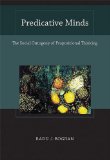
Predicative Minds: The Social Ontogeny of Propositional Thinking (Bradford Books) by Radu Bogdan (MIT Press, 2009)
Product Description
The predicative mind singles out and represents an item in order to attribute to it a property, a relation, an action, an evaluation; it thinks, and says, of a house that it is big, of a car that it is to the left of the house, of a cat that it is about to jump, of a hypothesis that it is plausible. The capacity to predicate appears to be neither innate nor learned, yet it is universal among humans. Puzzling in evolutionary, developmental, and philosophical terms, the mental competence for predication still awaits a coherent and plausible explanation. In this exploration of the predicative roots of human thinking, Radu Bogdan takes up the challenge.
Bogdan argues that predication is not only an outcome of development but also a by-product of uniquely human features of development, many of them social in nature and unrelated to representation, cognition, and thinking. Humans develop predicative minds for disparate reasons, which bear initially on physiological coregulation, affective and manipulative communication, and the socially shared acquisition of words. Once developed, the competence for predication in turn redesigns human thinking and communication. Predication is at the heart of conscious, deliberate, explicit, and language-based human thinking, and it is the fuel of higher mental activities. Understanding the uniqueness and representational power of the human mind, Bogdan contends, requires an explanation of why and how predication came to be.
Comments (0)
- cognitive science,new books,philosophy of mind
February 18, 2009
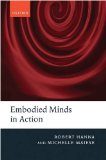
Embodied Minds in Action by Robert Hanna and Michelle Maiese (Oxford University Press, 2009) – Amazon promises “in stock on Feb. 22” and they have a sample available online.
Product Description
In Embodied Minds in Action, Robert Hanna and Michelle Maiese work out a unified treatment of three fundamental philosophical problems: the mind-body problem, the problem of mental causation, and the problem of action. This unified treatment rests on two basic claims. The first is that conscious, intentional minds like ours are essentially embodied. This entails that our minds are necessarily spread throughout our living, organismic bodies and belong to their complete neurobiological constitution. So minds like ours are necessarily alive. The second claim is that essentially embodied minds are self-organizing thermodynamic systems. This entails that our mental lives consist in the possibility and actuality of moving our own living organismic bodies through space and time, by means of our conscious desires. The upshot is that we are essentially minded animals who help to create the natural world through our own agency. This doctrine–the Essential Embodiment Theory–is a truly radical idea which subverts the traditionally opposed and seemingly exhaustive categories of Dualism and Materialism, and offers a new paradigm for contemporary mainstream research in the philosophy of mind and cognitive neuroscience.
Comments (0)
- consciousness,new books,philosophy of mind
February 11, 2009
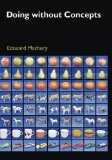
Doing without Concepts by Edouard Machery (Oxford University Press, 2009).
Publisher’s description:
Over recent years, the psychology of concepts has been rejuvenated by new work on prototypes, inventive ideas on causal cognition, the development of neo-empiricist theories of concepts, and the inputs of the budding neuropsychology of concepts. But our empirical knowledge about concepts has yet to be organized in a coherent framework.
In Doing without Concepts, Edouard Machery argues that the dominant psychological theories of concepts fail to provide such a framework and that drastic conceptual changes are required to make sense of the research on concepts in psychology and neuropsychology. Machery shows that the class of concepts divides into several distinct kinds that have little in common with one another and that for this very reason, it is a mistake to attempt to encompass all known phenomena within a single theory of concepts. In brief, concepts are not a natural kind. Machery concludes that the theoretical notion of concept should be eliminated from the theoretical apparatus of contemporary psychology and should be replaced with theoretical notions that are more appropriate for fulfilling psychologists’ goals. The notion of concept has encouraged psychologists to believe that a single theory of concepts could be developed, leading to useless theoretical controversies between the dominant paradigms of concepts. Keeping this notion would slow down, and maybe prevent, the development of a more adequate classification and would overshadow the theoretical and empirical issues that are raised by this more adequate classification. Anyone interested in cognitive science’s emerging view of the mind will find Machery’s provocative ideas of interest.
See also: “Concepts and Experimental Philosophy” and “Doing Without Concepts” at Brains
Comments (1)
- cognitive science,new books,philosophy of mind
February 8, 2009
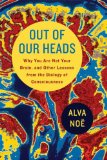
Out of Our Heads: Why You Are Not Your Brain, and Other Lessons from the Biology of Consciousness by UC Berkeley philosopher Alva Noë (one of the philosophers interviewed in the recent book ‘Mind and Consciousness: 5 Questions‘) is due out from Hill and Wang on Feb. 17 (according to Amazon) or Feb. 24 (according to the publisher).
(link for UK)
Publisher’s description:
Alva Noë is one of a new breed—part philosopher, part cognitive scientist, part neuroscientist—who are radically altering the study of consciousness by asking difficult questions and pointing out obvious flaws in the current science. In Out of Our Heads, he restates and reexamines the problem of consciousness, and then proposes a startling solution: Do away with the two hundred-year-old paradigm that places consciousness within the confines of the brain.
Our culture is obsessed with the brain—how it perceives; how it remembers; how it determines our intelligence, our morality, our likes and our dislikes. It’s widely believed that consciousness itself, that Holy Grail of science and philosophy, will soon be given a neural explanation. And yet, after decades of research, only one proposition about how the brain makes us conscious—how it gives rise to sensation, feeling, and subjectivity—has emerged unchallenged: We don’t have a clue.
In this inventive work, Noë suggests that rather than being something that happens inside us, consciousness is something we do. Debunking an outmoded philosophy that holds the scientific study of consciousness captive, Out of Our Heads is a fresh attempt at understanding our minds and how we interact with the world around us.
See also: Alva Noë on Edge.org
Comments (1)
- consciousness,new books,philosophy of mind
February 6, 2009
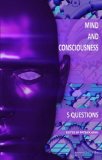
David Chalmers mentioned this book awhile ago and I just noticed it is available now: Mind and Consciousness: 5 Questions ed. by Patrick Grim (Automatic, 2009).
(link for UK)
Product Description
Debates concerning the nature of mind and consciousness are active and ongoing, with implications for philosophy, psychology, artificial intelligence and the neurosciences. This book collects interviews with some of the foremost philosophers of mind, focusing on open questions, promising projects, and their own intellectual histories. The result is a rich glimpse of the contemporary debate through some of the people who make it what it is. Interviews with Lynne Rudder Baker, David Chalmers, Daniel Dennett, Fred Dretske, Owen Flanagan, Samuel Guttenplan, Valerie Gray Hardcastle, John Heil, Terence Horgan, Douglas Hofstadter, Frank Jackson, Jaegwon Kim, William Lycan, Alva Noë, Hilary Putnam, David Rosenthal, John Searle, Steven Stich, Galen Strawson, Michael Tye.
Comments (0)
- consciousness,new books,philosophy of mind







